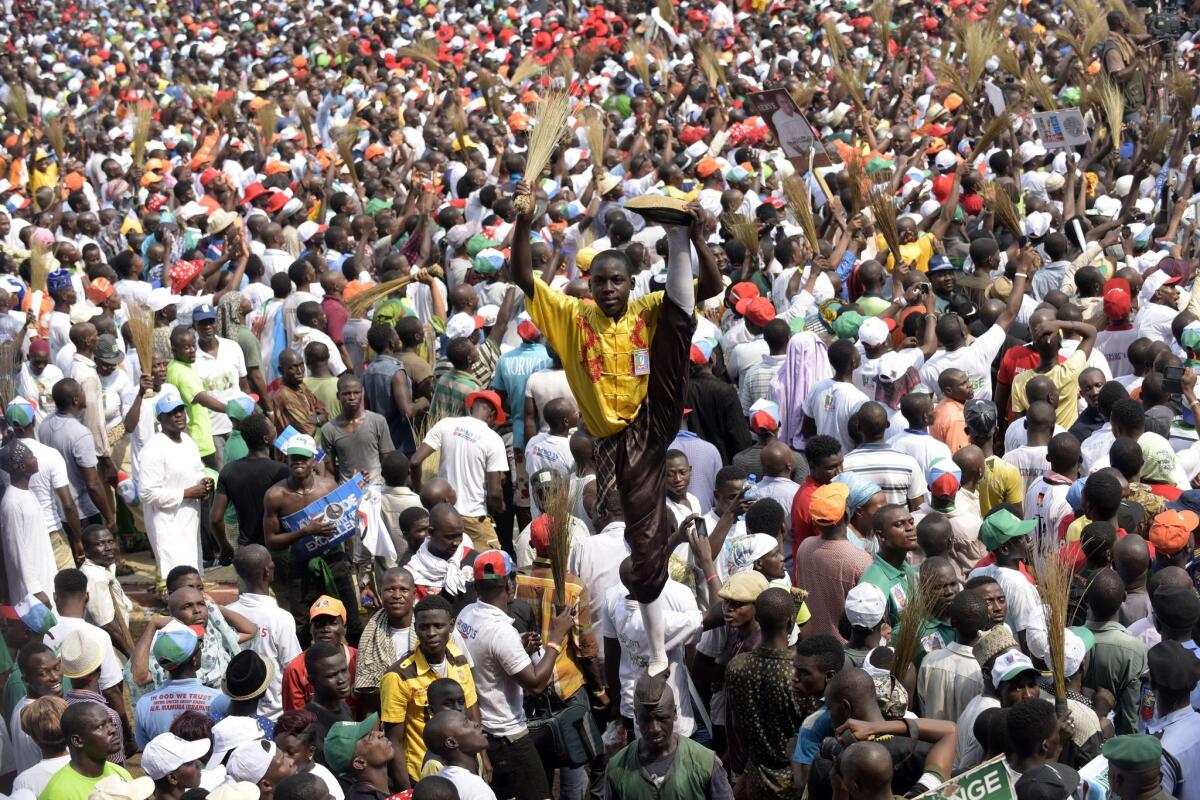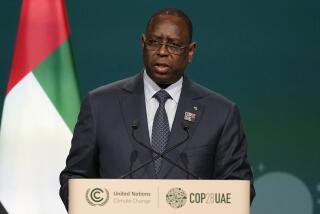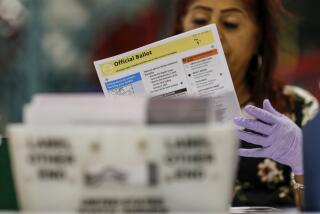Former U.S. envoy: Nigerian vote shaping up as ‘train wreck’

- Share via
Reporting from Johannesburg, South Africa — Amid predictions that Nigerian elections scheduled for next week will be a “train wreck” leading to disputed results and violence, protesters in the capital called Wednesday for the nation’s independent electoral commission to delay the vote.
A commission news conference in Abuja, the capital, spelled out the emerging logistical nightmare: With the election just 10 days away, 24 million of the 68 million plastic cards that voters are required to show when they cast their ballots haven’t been distributed. In Lagos, the nation’s commercial center, only 40% have been handed out.
In a second day of demonstrations calling for a two-month delay, protesters said the southern, predominantly Christian regions of Nigeria would be disadvantaged if balloting goes ahead as scheduled because voters there had received fewer cards.
Critics say the government was slow to get the cards out to distribution centers where voters must go to pick them up. An electoral commissioner, Amina Zachary, told Reuters news service on Wednesday that the election may be delayed if cards are not distributed on time, but said no decision had been made.
Princeton Lyman, a former U.S. ambassador to Nigeria, warned that the elections would be a “train wreck” if they are held next week because the country is unprepared, deeply divided and battling Boko Haram militants.
“All this points to the likelihood of fraud, contention and violence in the wake of the election no matter who wins,” warned Lyman in an opinion piece in Foreign Policy journal. “The country will not break apart, but large parts of it may become ungovernable, and the depredations of Boko Haram and perhaps other militias will increase.”
Sixteen of the 26 registered political parties and four of 14 presidential candidates also have called for a delay. They say the failure to distribute cards and the security crisis in the country’s northeast, where Boko Haram fighters have driven more than 1 million people from their homes, would undermine the election’s credibility.
“It is unfortunately becoming clear by the day that most Nigerians appear not to be ready for election but are ready for violence,” the parties and candidates urged in a statement Tuesday.
Nigeria’s national security advisor, Sambo Dasuki, was the first to call for a delayed vote, in a London speech last month. However, the main opposition party, the All Progressives Congress, or APC, strongly opposes any delay. It calls the proposal a plot by President Goodluck Jonathan and the ruling People’s Democratic Party, or PDP, to hold on to power in the face of a potential defeat at the polls.
Nigeria has seen the rare emergence of a strong opposition party with the support to potentially wrest power -- assuming a free and fair vote in a nation where most elections have been deeply flawed.
But Lyman said the rise of the opposition, in theory a good thing, comes at a time when Nigeria’s unwritten pact on sharing power between the mainly Muslim north and mainly Christian south is in tatters. The informal deal, in the form of an arrangement within the ruling party, involved rotating the presidency between the north and south, but it fell apart when Jonathan took power.
The dispute split the ruling party, and many powerful northern governors switched to the APC.
As Boko Haram -- an Islamist movement that is deeply opposed to democracy, taxes and secular education -- continues to ravage the north, both sides of the divide have accused the other of supporting the militants’ attacks for political purposes.
Jonathan’s supporters are convinced that northerners want their region to become ungovernable so the president and his administration will look ineffectual. The opposition believes that powerful figures in the ruling party see an advantage if the APC’s northern stronghold becomes too insecure for voting to take place there.
A recent joint report on the election by the National Democratic Institute and the International Republican Institute, U.S.-based nonprofit groups supporting democracy, said Nigerians were polarized, and warned of potential violence.
“Some Nigerians are fearful that should extraordinary steps not be taken to temper partisan rhetoric and stigmatization, violence could erupt in the strongholds of whichever candidate loses the presidential race,” the report said.
A recent opinion poll indicated that voter confidence in the honesty of the elections system had significantly eroded, from 51% in 2011 to 13% last year.
With the outcome closely fought, the two U.S. groups warned of the risk that losing candidates and their supporters might reject the election results.
In his Foreign Policy article, Lyman said Nigeria should delay the elections for a year and form a temporary national unity government to organize proper balloting, defeat Boko Haram, reshape the corrupt military and stabilize the north.
“The international community, which wants to see both peaceful elections and more forceful action against Boko Haram, should support an agreement for a postponement along these lines,” he argued.
But some opposition parties fear a delay will only help the government cling to power.
“The APC is ready for the elections as scheduled. The PDP and the Jonathan administration should stop their scheming and get themselves ready for the elections too,” APC spokesman Lai Mohammed said at a news conference Tuesday.
Calls for delayed came as Chadian troops involved with regional efforts to combat Boko Haram surged into Nigerian territory from Cameroon after a militant attack in the latter country.
A spokesman for Chad’s military told the Agence France-Presse news service that about 2,000 Chadian soldiers entered Nigeria, killed approximately 200 Boko Haram fighters and drove them from the border town of Gamboru. Nine Chadian soldiers were killed in the fighting on Tuesday and Wednesday.
Follow @robyndixon_LAT on Twitter for news out of Africa
More to Read
Sign up for Essential California
The most important California stories and recommendations in your inbox every morning.
You may occasionally receive promotional content from the Los Angeles Times.













